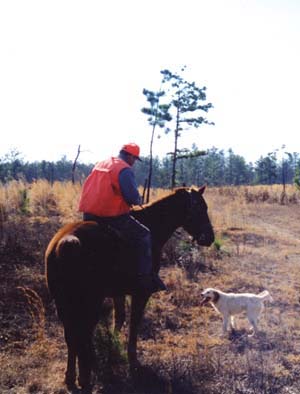Tar
Heel Travels
Quail Hunting
A tramp through the winter woods
finds peace, and bird on the wing
Left: When he's
not leading a hunt, Clayton Myrick trains bird bogs |
 |
By Bill F. Hensley
Clayton Myrick is a business man, but his office isn’t in an office building;
it’s 1,000-acre tract of rolling, broomstraw meadows and forests of Longleaf
pines. He offers two services for the public: he is a top hunting guide and a
certified dog trainer. The 39-year-old Myrick is an expert in both and proudly
displays a number of awards and trophies that exemplify excellence in his field.
For six months each year — from October through March — he combs the
undulating terrain near West End behind a pair of well-trained, sharp-nosed dogs
who “point” when they identify their quarry He can spot a point through the
thickest brush or in the deepest woods. After a covey of quail†rises, he knows
where the downed birds fell and where those that escaped set down under cover.
In between points, the genial, soft-spoken Moore County native is quick with the
needle, especially if a hunter’s marksmanship was less than spectacular.
“Are you shooting blanks,” he will ask of the clients he knows best, “or
were you just trying to scare them?” The wry grin on his face lets you know
he’s just kidding, but the veteran hunter knows that taking better aim is now
a high priority.
“I never kid my hunters unless I know them well,” he explains. “I had a
group down from New York recently, and they couldn’t have hit a barn from the
inside. Four hunters bagged only a half-dozen birds all day. Later they asked me
to give them some impromptu shooting lessons, which I was glad to do. Their
shooting got better as time went on, thankfully.”
Myrick is a seasoned guide at one of North Carolina’s best and most popular
hunting preserves. Pine Lake Plantation, off Highway 73 between Taylortown and
Robbins, was founded in 1963 by Jack Myrick, Clayton’s father. The younger
Myrick began working as a guide in 1980 and has been leading quail hunting
parties ever since, usually going out twice daily during the long preserve
season.
“I love what I do, but it is demanding work,” he says. “I walk five or six
miles a day, six days a week, so I stay in good physical shape. When I’m not
leading a hunting party, there are dogs to feed and clean up after and fields
and habitat to maintain. I don’t have a lot of free time.”
During the season, Myrick will host about 500 hunters from around the state and
the nation who pay $125 for a half-day and a limit of 10 birds (Myrick restocks
his plantation on Sundays). If a hunter bags more than his limit — which is
permissible — it costs an extra $6 per bird. There is a—50†cents per bird
cleaning fee.
“Since its founding, our preserve has done well,” Myrick offers. “We do
everything to make a hunt as realistic as possible. Finding wild coveys these
days is a rarity so a preserve enables the avid hunter to continue a
long-standing tradition. A hunter knows he will always find birds here.”
At the end of each season, Myrick — a one-man staff except for his mother, who
handles the administrative chores — swings into six months of extensive dog
training, along with his field maintenance chores to provide food and cover for
quail. Throughout the year, there are usually around 20 or more dogs in his
kennel to be taught the finer points of hunting.
Myrick said that it takes four to six weeks to train a bird dog at a cost of
$200 per month for the service. A good dog, he said, will bring about $1,500 on
the market. Several years ago he sold a dog for $12,000, a personal record.
On the Pine Lake property, which he leases, Myrick plants milo, millet, field
peas, partridge peas, bi-color lespedeza, corn and buckwheat for the quail to
feast on. For cover, the fields and forests offer a variety of vegetation that
provides refuge.
“Predators are still a big problem in this business,” he states wistfully.
“There is little we can do to control the situation because raccoons,
opossums, foxes, hawks — even house cats — are numerous. They get almost as
many birds as the hunters. That’s a major reason that wild birds are all but
extinct.”
A special thrill for Myrick was serving as a guide to an Olympic marksman
shortly before the Atlanta event 1996. “I have never seen anything like it,”
he says. “The guy — from New Jersey — hunted with a .22 rifle, and he
never missed a shot. He was unbelievable.”
In the 23 years he has been a guide, there has been only one accident, and
Myrick was the victim.
His second year on the job, a stray shotgun pellet ricocheted and hit him in the
eye, causing him to lose his eye.
“An accident like that wouldn’t happen once in a hundred years, but it
happened to me. That’s why I preach — and demand — safety in all hunts.
One can’t be too careful. And all my hunters have to wear eye protection, for
sure.”
For more information and reservations on Pine Lake Plantation, call
910-947-5302.
Return
to magazine index
|